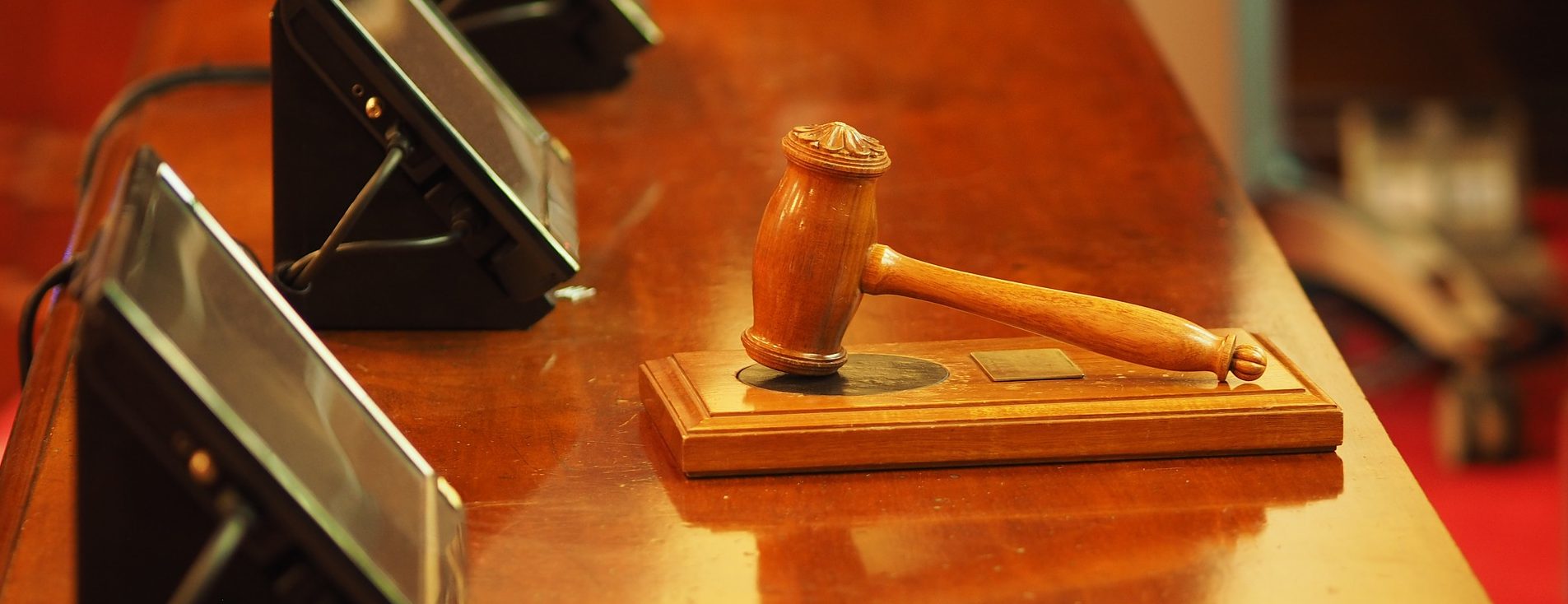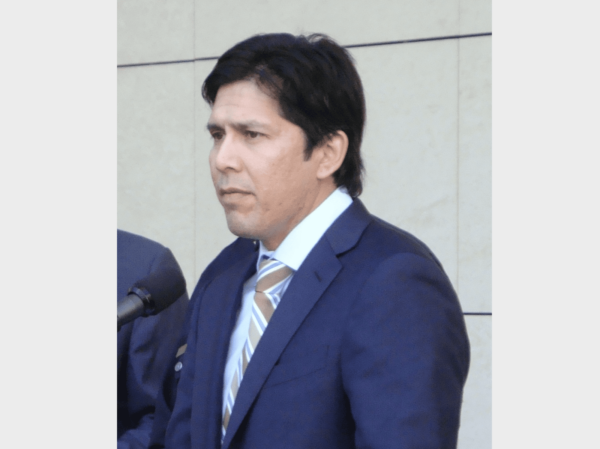A state watchdog agency for judges Tuesday cleared Orange County Superior Court Judge Michael Murray of any official misconduct as a prosecutor in his handling of a case involving the death of a Los Angeles County sheriff’s deputy in a crash.
The state Commission on Judicial Performance recommended no discipline over Murray’s handling of the prosecution of Cole Wilkins in the July 7, 2006, crash that killed off-duty L.A. County Sheriff’s Deputy David Piquette.
The ruling adopted a recommendation from a panel of judges for the commission handed down in July. In October, the full commission heard further oral arguments on the matter and handed down a final ruling on Tuesday.
The main difference the commission had with the panel, however, was whether the agency could investigate or discipline judges for conduct before they joined the bench. The full commission argued the agency does have that role.
“When an attorney is found to have committed ethical violations prior to becoming a judge, it negatively affects the public’s confidence in, and perception of, the judiciary,” the commission wrote.
“The purpose of a commission disciplinary proceeding is the protection of the public, the enforcement of rigorous standards of judicial conduct, and the maintenance of public confidence in the integrity and independence of the judicial system. As such, it is the commission’s responsibility and mandate to investigate and discipline judges for pre-bench misconduct, including pre-bench prosecutorial misconduct, where appropriate.”
In July, a panel of judges for the state Commission on Judicial Performance recommended no discipline. The panel of special masters heard evidence in the case in April and May. The full commission had final say.
Wilkins’ attorney, Sara Ross of the Orange County Public Defender’s Office, said, “The opinion seems to allow disciplinary proceedings against judges for their unethical behavior as prosecutors. The problem is that rulings like this eviscerate our faith that this process will ever hold judges accountable. The message that comes loud and clear is that, even in a case with a mountain of evidence like this one, judges will nearly always protect judges.”
The case against Murray revolves around the prosecution of Wilkins, who stole several appliances from an under-construction Menifee home, crammed them onto a Ford F250 pickup truck’s back and fled without putting up the tailgate and not securing the goods properly.
A stove tumbled off the truck onto the Riverside (91) Freeway, triggering the crash that killed Piquette.
Murray noted that he took over the case from another prosecutor, who had filed the original case of first-degree murder against Wilkins.
“It had been through a preliminary hearing and a (motion to dismiss),” with an appeal that went up to the state Supreme Court, Murray told the commission in October. The issue in the appeal was whether first-degree murder charges could be filed in the case, Murray said.
Prosecutors have the leeway to charge murder in a deadly crash if the driver was involved in an ongoing felony such as fleeing the scene of a burglary. But eventually the case was sent back on appeal for a retrial because of an issue with instructions given to the jury on that area of law.
In Wilkins’ case, he stopped at some point after stealing the appliances, so that would allow him to argue a legal theory known as “safe harbor,” which means he interrupted the original felony, so it cannot be linked to the crash. Murray said when the case was sent back for a retrial the appellate ruling noted Wilkins could continue to face a murder charge.
The commissioners asked Murray why he did not accept a request for a delay in sentencing Wilkins after his first trial when the defendant’s attorney, Joseph Vodnoy, raised issues about a dispute that had arisen among California Highway Patrol officers about what caused the crash. Some officers faulted Piquette’s driving, while others said the stove on the freeway caused the crash.
Murray said the Wilkins trial “was a very emotional event” for the victim’s family, so he told Vodnoy that he just wanted to set one sentencing date to spare the victim’s widow and their two 5-year-old twins from having to attend any more court hearings.
“I asked Vodnoy to pick a date and stick to it,” Murray said.
“Three days before sentencing he did the very thing I asked him not to do — he filed a motion to continue,” Murray said. “He said he had been on vacation and the (probation report) was long and he didn’t have a fax of it and was not prepared for sentencing.”
Murray told Vodnoy he did not want to postpone the sentencing in 2011 and that the defense attorney did not offer adequate reasons for doing so. But Vodnoy then said that he was made aware of the dispute among CHP officers and that there was an investigation going on about it.
“This was the first time he said there’s an investigation or allegations of an investigation,” Murray said. “I said, great, then put it in an affidavit and we’ll litigate it, and he didn’t do that.”
Vodnoy offered more details to the sentencing judge, who rejected the request to continue the hearing. Murray said Vodnoy’s explanation for the need for a continuance “didn’t make sense to me” at the time.
Murray said it was “inconceivable to me” that any of the investigators would doubt the stove was a “substantial factor” in the crash.
“To me, that was the most straightforward part of the case,” Murray said.
When a commissioner asked him if it wasn’t unusual that a law enforcement officer was doubting whether a murder charge should be filed against someone who killed a deputy, Murray said it did not faze him.
“I respectfully don’t agree” that it is unusual, Murray said.
The judge said that in his 14 years in the homicide unit, it was rather routine for many people to question a filing decision.
“I was comfortable with the charges based on my understanding of felony murder,” Murray said.
Murray’s attorney, Edith Matthai, said “the chronology in this case is important.”
Vodnoy never pursued the claim that CHP supervisors changed an initial police report faulting Piquette for the crash, Matthai said.
“There’s no follow-up,” she said. “It’s not raised on appeal.”
Murray was a busy prosecutor who moved on to his next case, Matthai said.
The case was sent back for a retrial in 2013, Matthai said. Two years later, the Orange County Public Defender’s Office began representing Wilkins and raised a motion of outrageous governmental misconduct based on the changed report.
In July 2015, Murray reviewed the report and then realized it was evidence that should have been turned over to defense attorneys, Matthai said. Before that, Murray had been away from work as he recuperated from major back surgery and the original prosecutor who filed the case was back on it, she noted.
The commission’s attorney, Mark Lizarraga, argued that Murray had a “continuous duty to disclose (the altered report evidence) and to inquire” about the allegations.
“We’re not trying to ask the commission to discipline Judge Murray for anything in 2008,” Lizarraga said.
But the commission can use his actions then “to determine his intent and state of mind” throughout his handling of the case, Lizarraga argued.
When Murray was made aware of the evidence of an altered report he realized it was potentially “exculpatory” and yet “did nothing,” Lizarraga said.
“He can’t be intentionally indifferent,” the attorney argued. “He has to inquire. He has to learn and he has to disclose if it’s out there.”
As another prosecutor in the case argued that the office did not run afoul of the Brady law governing turning over exculpatory evidence to defense attorneys, Murray did not try to interject, Lizarraga said.
“He’s the lead,” Lizarraga argued. “He’s not there to seek justice or to ascertain the truth. He’s there to protect his case and to get results. He has completely forgotten the true role of a prosecutor.”
The special masters said in July there was no evidence Murray knew of the alleged Brady material before July 2015. They also noted that Murray was open to considering a delay in sentencing, but he wanted Vodnoy to put his allegations in writing, which he did not do.
The fact that Vodnoy did not follow through “supports our finding that Murray did not act in bad faith,” the special masters wrote.
The commission in its final ruling on Tuesday noted how Murray was “walled off” from the case in 2015 as public defenders pursued an outrageous governmental conduct motion. The commission found there was no showing that Murray knew of evidence that should have been turned over to defense attorneys during that time, but when he did find out about it he told the new prosecutor on the case to turn over the evidence.







